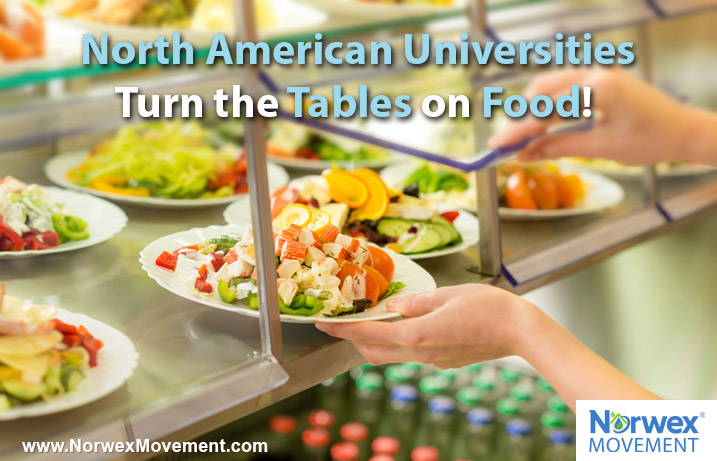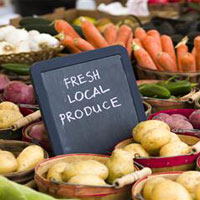

These days, campuses across the continent are buying in to sustainable agriculture, providing healthier food for students. These beneficial options are 100% organic, which means they are produced without pesticides or other chemicals. Not only does this help preserve the integrity of the food, it’s also easier on the environment. Most exciting, perhaps, is that many of these institutions are relying solely on local producers. But this can also bring challenges.
What does “locally” grown really mean?

According to the Report on Sustainable Development at the University of Ottawa, in 2013 the university became Canada’s seventh to earn the Fair Trade Campus designation. Seventy percent of food products offered in the campus’s main cafeteria were grown or produced within 500 km (310 miles) of the campus, and 27% was grown or produced within the province of Ontario. But in a 2008 consumer survey, half of the survey group assumed that “local” food was grown or raised within 100 miles of their homes.
Sustainable is preferred, but not always possible

Since 2009, all ten campuses of the University of California system have added sustainable foods as part of its policy on sustainable practices. One of the original goals of the U.C. system’s program was to purchase at least 20% of its food from sustainable sources by 2020. The U.C. system is well ahead of that goal already, having reached the 20% mark four years early.
But the program is also not without its challenges. Tim Galarneau, Co-chair of the university’s Sustainable Food Service Working Group as well as its Global Food Initiative’s Food Access and Security Subcommittee, says the system’s large size can make it hard to source and maintain sustainable food vendors for the length of the contract. Said Galarneau, “If there are entrepreneurs out there who want to create an organic, sustainable mozzarella cheese at the institutional scale, they would make a killing in California.”
Corporate profit-seeking is also hindering efforts by the University of California system to locate sustainable food sources. Because 99% of produce in California is exported, finding enough local food producers to support the system can be a challenge.
Another challenge in sourcing locally grown food is local climates. Harsh conditions such as drought or freezes, coupled with the long distances food must sometimes travel, can also spell shortages.
The good news is that, despite these challenges, BestColleges.com’s list of greenest U.S. universities continues to grow!
Watch this video to learn how the University of California Santa Cruz is putting sustainability on the menu.
Resources:
I’m on the fence about whether or not to believe that the produce at my local grocery store is actually organic. They charge so much and you hear a lot of negativity through the media about actual organic foods. If we had more sunlight in our yard at home, I would plant and grow our own food.
Universities are places of learning – they specialize and are known for various subject matter, not necessarily places to eat. Eating fair trade food, sustainable food etc.. is more an individual responsibility. If those attending institutions that are not supplying organic, locally grown food – pack a lunch and don’t eat there. That is how “food services” will get the message. Promoting sustainability, composting, fair trade and local organic menus needs to be a populus revolution. The retailer will follow suit!
We know where our produce is grown much of the time, because it is in our own back yard! We also buy (and sell) at the Farmers Market. If you really want to know how and where it is grown, supporting your local markets is best. We also buy eggs from a friend, so we know they are free-range (except in our deep Minnesota winters) and treated/fed well.
And no wondering what was used to prevent pests, when they’re grown in your own backyard. Thanks for sharing, Jeanette!
People in our community are more and more wanting fresh organic food. We have a relatively new local source with Strike Farms. They seem to be getting more well known and popular! We do have a cold winter so growing season is limited.
This is probably the next “Big Area” I want to tackle in our home. I need to make the time and effort to buy more organically. Although, for the last 14 years, I have bought my F&V straight off a truck that comes from the markets – I don’t think most of it is organic..
I was very excited when we went to Disney World to learn that they grow all the produce used in their restaurants.
I do not make an effort to purchase organic food items, mainly because of the cost.
As a former manager of a Certified Farmers Market in Central California (the breadbasket of the world), I actually laughed out loud at the quote about “sustainable mozzarella in California would make a killing”.. there is NO WAY anyone will ever “make a killing”, let along make a LIVING producing organic or sustainable cheeses in California until and unless they loosen up the overbearing regulations and taxes and fees on small and organic farmers. We have ONE successful dairy in all of California that sells raw, organic, pasture raised milks and cheeses, and they are regulated to the point where they must charge $16 per gallon for organic raw milk!! It’s madness! Kudos to California for aiming for sustainability.. Now they just need to stop being so tax and regulation happy to help make that happen, instead of driving small farmers into the dust.